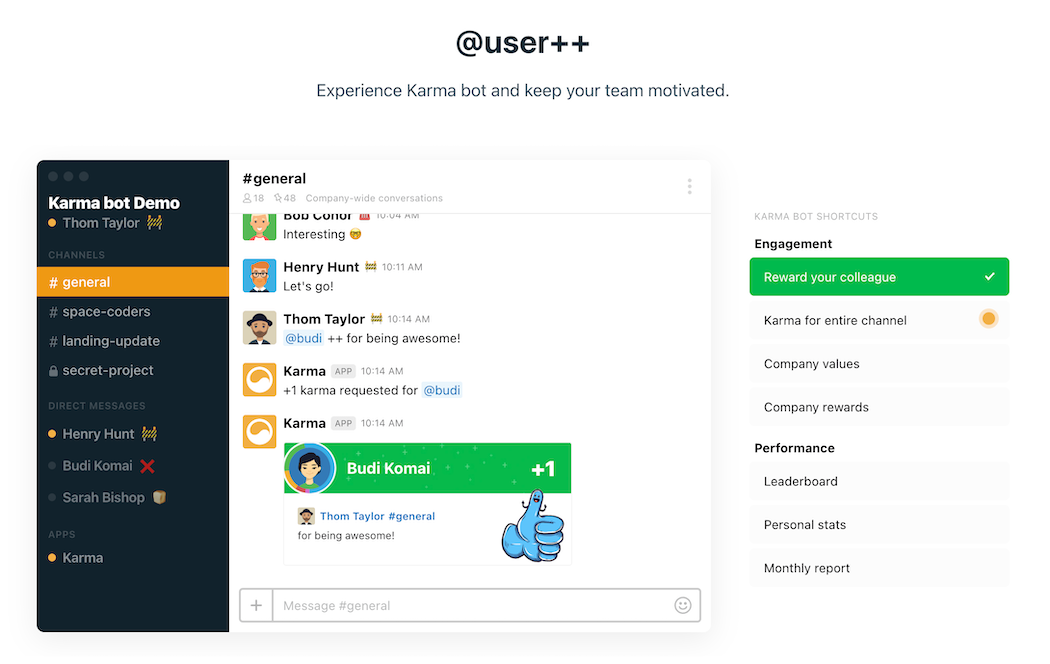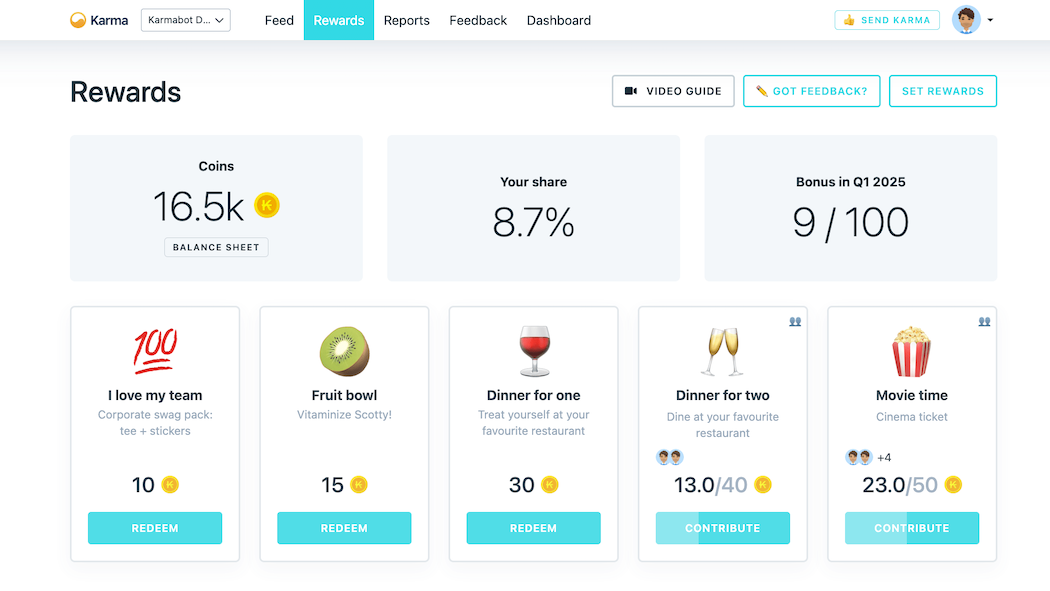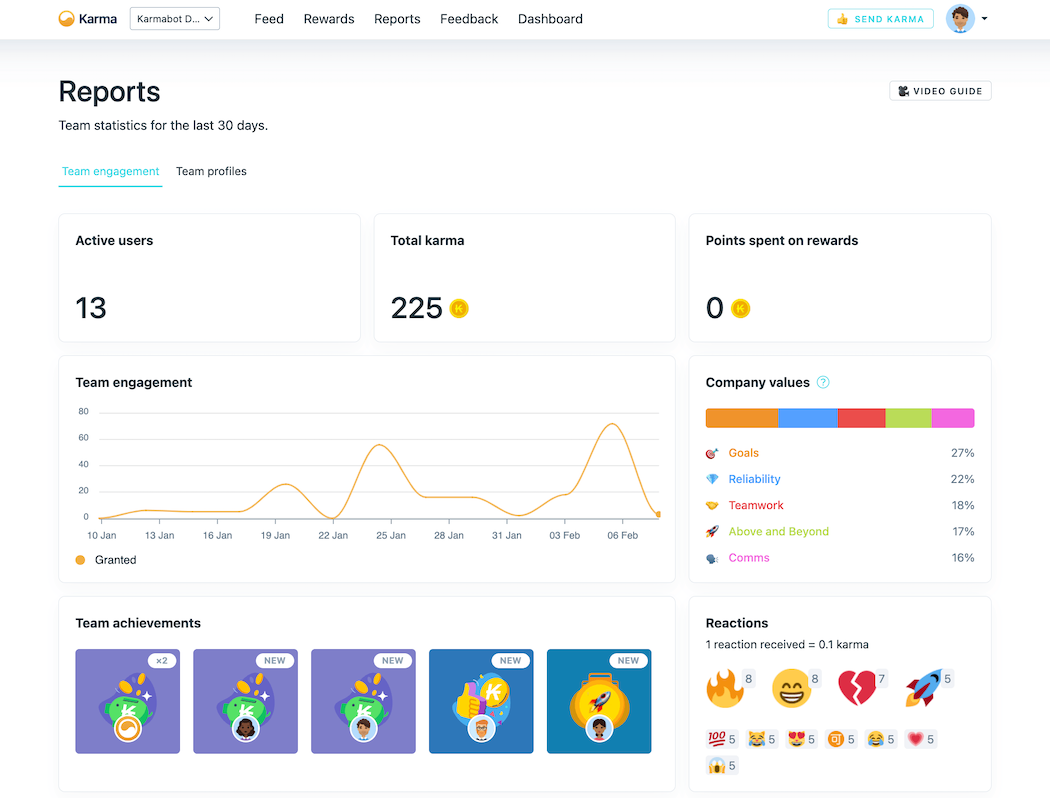Employee recognition is no longer just a ‘nice-to-have’—it’s a strategic imperative. HR leaders across industries are investing in recognition programs to drive engagement, increase retention, and foster a high-performing company culture. Studies show that companies with strong recognition programs see 31% lower voluntary turnover and productivity increases by 20%.
But what makes a recognition platform truly effective? The answer lies in the right features. With Karma Recognition, HR leaders can integrate seamless, impactful recognition into their organization’s daily workflow. Let’s explore the top five Karma features every HR leader should know—and how they can transform your workplace.
1. Peer-to-Peer Recognition: Making Appreciation a Daily Habit
Traditional top-down recognition programs are effective but often infrequent. Employees crave more immediate and authentic appreciation from colleagues, not just from managers. That’s where peer-to-peer recognition comes in.
Why It Matters
- 79% of employees say they work harder when their efforts are recognized by peers.
- Companies with strong peer-to-peer recognition cultures have 35% higher employee engagement.
How Karma Helps
With Karma, recognition is democratized—anyone can give kudos to a teammate for their hard work. This fosters a culture of continuous appreciation, making recognition a daily habit rather than an occasional event.
Employees can:
- Give Karma points for great work.
- Attach meaningful messages to reinforce positive behavior.
- Track recognition over time to see how their contributions are valued.
HR Tip: Encourage managers to participate in peer-to-peer recognition as well—it sets a precedent for appreciation at all levels.

2. Customizable Rewards System: Aligning Recognition with Company Values
Recognition is most powerful when tied to meaningful incentives. A generic “good job” is nice, but tangible rewards create a deeper impact.
Why It Matters
- 69% of employees say they would stay longer at a company if they had more recognition.
- Employee happiness increases by 23% when rewards are linked to company values.
How Karma Helps
Karma allows HR teams to fully customize rewards so that recognition aligns with business goals.
Features include:
- Custom reward options, such as automated gift cards, extra PTO, team activities, or company-branded swag.
- Point-based systems that let employees redeem rewards over time.
- Automated milestones for birthdays, work anniversaries, and key achievements.
HR Tip: Consider tying rewards to behaviors that drive company success, such as innovation, collaboration, or leadership.

3. Data-Driven Insights: Tracking Engagement & Recognition Trends
HR leaders need data to measure the effectiveness of recognition programs. Without analytics, it’s hard to tell whether recognition efforts are making a real impact.
Why It Matters
- 71% of HR professionals say they need better data to optimize engagement strategies.
- Companies using analytics-driven recognition programs see a 14% boost in productivity.
How Karma Helps
Karma provides real-time analytics to help HR teams track trends and optimize programs.
Key analytics include:
- Who gives and receives the most recognition (helping HR spot high performers).
- Which teams participate most in recognition (and where engagement may need a boost).
- Correlation between recognition frequency and retention rates.
HR Tip: Use Karma’s insights to refine HR strategies—if a team lacks engagement, recognition might be the missing piece.

4. Anonymous Feedback: Encouraging Honest and Constructive Input
Employees often hesitate to provide honest feedback due to concerns about workplace dynamics. A system for anonymous feedback ensures that everyone feels safe expressing their thoughts.
Why It Matters
- 65% of employees feel uncomfortable giving direct feedback to managers.
- Companies that encourage open feedback have 21% higher performance rates.
How Karma Helps
Karma’s anonymous feedback feature empowers employees to share their opinions without fear of repercussions.
Key benefits include:
- Secure, confidential feedback channels for employees and managers.
- Ability to track trends in employee sentiment over time.
- HR and leadership teams receive actionable insights for workplace improvements.
HR Tip: Use anonymous feedback to spot concerns early and foster a culture of transparency and trust.
5. Connect Feature: Facilitating Meaningful Employee Interactions
With remote and hybrid work environments, many employees miss out on casual, spontaneous workplace interactions. The Connect feature ensures that employees stay engaged and build meaningful relationships.
Why It Matters
- Remote employees are 2x more likely to feel isolated.
- Strong workplace relationships increase employee satisfaction by 50%.
How Karma Helps
Karma’s Connect feature randomly pairs employees for one-on-one video meetings, helping them build relationships and improve collaboration.
Key benefits include:
- Encourages cross-team communication and reduces silos.
- Helps new hires integrate faster into company culture.
- Creates a structured yet informal way for employees to network and share knowledge.
HR Tip: Use the Connect feature as part of your onboarding process and to strengthen cross-department relationships.
Final Thoughts: Why HR Leaders Love Karma
HR leaders are responsible for creating an environment where employees feel valued, engaged, and motivated. The right recognition platform makes this process effortless and impactful.
With Karma’s peer-to-peer recognition, customizable rewards, data-driven insights, anonymous feedback, and the Connect feature, HR professionals can build a recognition-rich culture that drives retention and productivity.
If you’re looking for a simple, scalable way to enhance your company’s recognition efforts, Karma has you covered.
Try out Karma for Slack with our demo and subscribe to your 30-day free trial:


 Why Small Acts of Recognition Can Have Big Impacts
Why Small Acts of Recognition Can Have Big Impacts